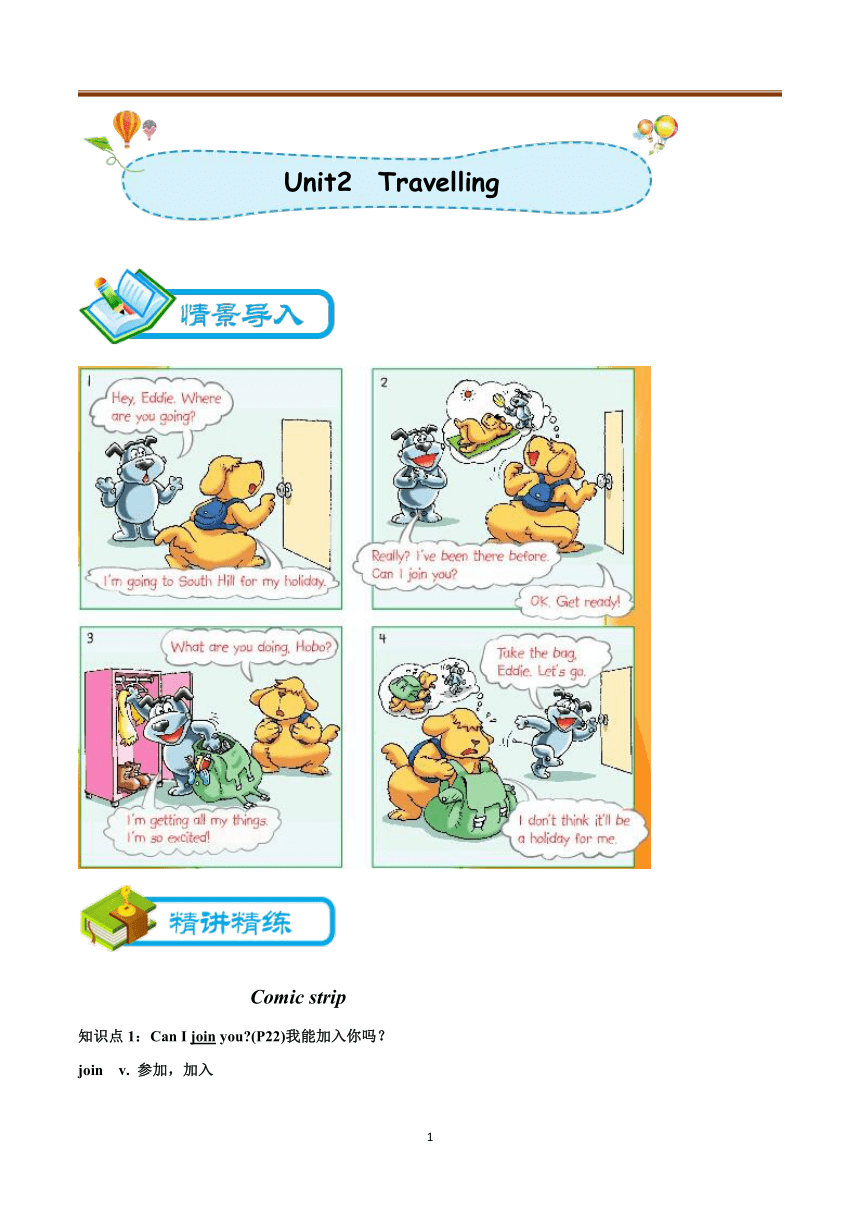
Comic strip 知识点1:Can I join you?(P22)我能加入你吗? join v. 参加,加入 【例句】Every young man in the village joined the fight. 【拓展】join/join in/ take part in 对比. join + 。 eg: He joined the Party (党)last year. join in + 。 eg:If you cannot attend, you can still join in the conversation. take part in + 。 eg:We still decided to take part in an important race across the Atlantic. 知识点2:I’m so excited. 我很兴奋。(P20) excited 形容词,意思是“感到兴奋的,感到激动的”。 短语:be excited at/about sth. 对某事感到激动 be excited to do sth 对做某事感到激动 be excited+that从句 因….而激动 excited 感到兴奋的、激动的 (主语一般是人) exciting 令人兴奋的 (一般说明或修饰物) 类似的词:amazed, amazing; boerd,boring; interested,interesting。 【即学即练】 1、She was really _____. (excite) 2、We are very _____about the _____ news. ( excite) 知识点3:I don’t think it’ll be a holiday for me. 我想对我而言,这不会是个假期了。 否定前移 这是一个含有宾语从句的主从复合句,I don’t think是主句,it’ll be a holiday for me 是宾语从句。在一般现在时的句子中,当主句主语为第一人称,谓语动词是think, believe 等动词,宾语从句为否定意义时,要将否定词转移到主句中,即主句的谓语动词用否定式,而从句的谓语动词用肯定式,这种语法现象就是否定前移。翻译成汉语时,要注意将否定的意义还原到从句中去。 【即学即练】 1、I don’t think that Jenny will come to his party. 翻译:_____. 2、I don’t think the pollution here is serious. 翻译:_____. 知识点4:It comes from the story by Hans Christian. (P21) (1) come from 意为“来自,始于”。相当于be from。. (2) by 此处用作介词,意为“来自,始于,由,被,常构成被动态。在这个句子中,by前可加written。 【拓展】by的其它用法: 乘(车、船)等 by bus 乘汽车 (指时间)不迟于 by ten o’clock 不迟于十点钟 在…..旁边,靠近 by the window 在窗户旁边 Reading 知识点5:We are having a fantastic time here. 我们在这玩得很开心。 have a fantastic time= have fun=enjoy oneself have a fantastic/good/great/wonderful time doing sth 开心做某事 【即学即练】 The girls often have a good time_____(talk) at lunch time. 知识点6:It moved at high speed and was really exciting! 它高速转动,的确很令人兴奋。 (P22) at high speed 以高速 at low speed 以低速 at full speed 以全速 at a/the speed of… 以…..的速度 知识点7:Next , we hurried to a restaurant to have a quick meal. 接着,我们匆匆去了一个餐馆,快速吃了一顿饭。(P22) (1)hurry 此处用作不及物动词,意为“匆忙,赶忙”。 常见搭配:hurry+to+地点名词 匆忙去某地 hurry to do sth 匆忙做某事 hurry up 赶快 hurry off 匆忙离开 【拓展】hurry 也可做名词,意为“匆忙,赶忙”。 in a hurry 匆忙地 【即学即练】 1、Hurry up, or we _____(miss) the bus. 2、She picked up her bag and _____(hurry) off. (2)动词不定式短语作目的状语 to have a quick meal 在句子中作目的状语,说明去餐馆的目的。动词不定式作目的状语可位于句首,用逗号与其他部分隔开,也可位于句末。 【即学即练】 1、_____(learn) English, she went to Japan. 2、She should come up with an idea _____(improve) the situation. 知识点8:On the way, we met some Disney cartoon characters, such as Snow ... ...
~~ 您好,已阅读到文档的结尾了 ~~